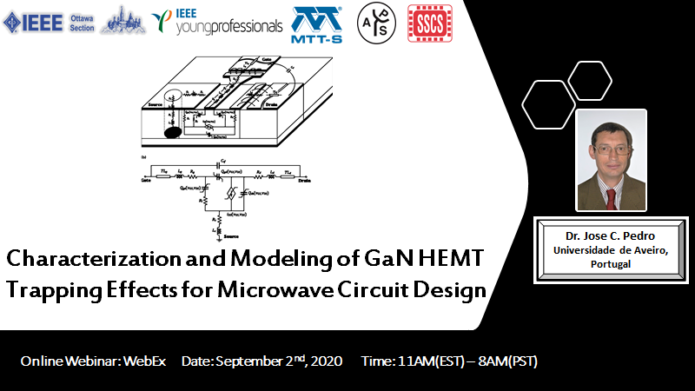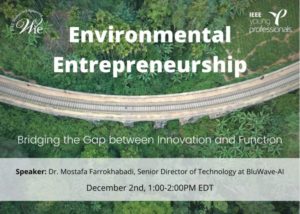Events

IEEE Ottawa Section: MTT-S / AP-S Chapter presents:
Title: Characterization and Modeling of GaN HEMT Trapping Effects for Microwave Circuit Design
Date: September 2nd, 2020
Time: 11 AM (ET)
Register at: https://events.vtools.ieee.org/m/238482
This talk will review some recent advancements achieved on the characterization and modelling of the trapping effects felt in GaN HEMT transistors, and their impact on microwave circuit design. Because of their nowadays importance, a particular attention will be payed to applications on high power amplifiers for mobile wireless infrastructure and pulsed radar applications.
For that, the talk will start by recollecting the most common model formulations adopted for the various levels of RF engineering, from the device level (physics) to the transistor (circuit) and amplifier (system) level. Starting by the Shockley-Read-Hall capture and emission processes we will be able to understand one of the fundamental signatures of trapping effects, the significantly different charge and discharging time constants, and its impact on power amplifier nonlinear distortion behavior. Then, some widely adopted approaches of the channel current transients’ characterization are addressed and the talk concludes by presenting some illustrative cases of application to RF high power amplifiers.
Speaker: Jose C. Pedro
José C. Pedro received the Diploma, Ph.D., and Habilitation degrees in electronics and telecommunications engineering from the Universidade de Aveiro, Aveiro, Portugal, in 1985, 1993, and 2002, respectively.
He is currently a Full Professor with the Universidade de Aveiro and head of the Aveiro site of the Instituto de Telecomunicações. He has authored 2 books and authored or co-authored more than 200 papers in international journals and symposia. His current research interests include active device modelling and the analysis and design of various nonlinear microwave circuits.
Dr. Pedro was a recipient of various prizes including the 1993 Marconi Young Scientist Award, the 2000 Institution of Electrical Engineers Measurement Prize, the 2015 EuMC Best Paper Microwave Prize, and the Microwave Distinguished Educator Award. He has served the scientific community as a Reviewer and an Editor for several conferences and journals, namely, the IEEE TRANSACTIONS ON MICROWAVE THEORY AND TECHNIQUES, for which he was the Editor-in-Chief.
Date: Sept 24th, 2020
Time: 02:00 PM to 03:00 PM EDT
Speaker: Ken Coates, Professor, University of Saskatchewan
Topic: Technology-Enabled Indigenous and Remote Communities
Registration:Â https://events.vtools.ieee.org/m/238665Â
Summary:
As the COVID-19 Pandemic demonstrated, almost all Indigenous and remote communities suffered from serious infrastructure deficits. With limited or unreliable Internet, poor quality electricity, and weak health care services, these communities were uniquely vulnerable to the disease and the economic and social challenges that accompanied the pandemic. But Canadians already knew that Indigenous and remote communities are poorly served and largely lift out of the so-called “innovation economy.” It is time to develop a strategy for bringing technology-enabled opportunities to Indigenous and remote communities. This webinar presents a model for digitally-enabled Indigenous and remote communities, explores the barriers to implementing this “inversion” of Canadian innovation and that contemplates strategies for addressing quality of life issues in collaboration with residents and local governments.
Biography:
Ken Coates is Canada Research Chair in Regional Innovation at the Johnson-Shoyama Graduate School of Public Policy, University of Saskatchewan. His work focuses on the development of strategies to promote 21st century well-being in small town, rural, Indigenous and remote Canada. Ken’s major project examines the potential contributions — and negative impacts — of emerging technologies on rural and remote communities.
For more information and speaking opportunity, please contact, Dr Kexing Liu, IEEE Canada Outreach and Partnership Committee Chair, kexing.liu@ieee.org

About this Event
Environmental Entrepreneurship: Bridging Gap between Innovation and Function
Abstract:
Environmental challenges of the current century are systemic threats
to the fabric of our civilization. In this context, environmental
entrepreneurship has emerged as a key mitigation concept that combines
economic and environmental dimensions by leveraging state-of-the-art
technology innovations. Seeing entrepreneurship through the lens of
engineering innovation is crucial to produce actionable theory for
sustainable technology. But what are the environmental entrepreneurship
elements, challenges, and success factors? How can researchers,
technology innovators, and entrepreneurs connect to this emerging field?
This seminar introduces environmental entrepreneurship as the process
of discovering, evaluating, and exploiting market forces that allow to
have effective and fast business cases in environmentally-relevant
markets. The seminar will also discuss views on bridging academic
innovation and technology productization to deliver pragmatic solutions
to environmental challenges of the planet.
Speaker Biography
Dr. Mostafa Farrokhabadi is the Senior Director of Technology at
BluWave-ai, an internationally award-winning startup offering
data-driven control and optimization solutions for smart grids. He has
10 years of experience in designing mission-critical grid solutions for
industry and academia, including technical leadership of a $6M
international consortium in Electric Grid Modernization, and Smart Grid
projects with Hatch and Canadian Solar. Mostafa has authored/co-authored
several high-impact technical papers and patents on intelligent control
and optimization of renewable-penetrated grids. Mostafa obtained his
Ph.D. in Electrical and Computer Engineering from the University of
Waterloo. He has also studied and performed research in Sweden at KTH
and Germany at KIT. Mostafa has received multiple business, research,
and teaching awards, including the prestigious University of Waterloo
Doctoral Thesis Completion Award and Ottawa’s Forty Under 40. Currently,
he serves as an Associate Editor of the IEEE Transactions on Smart Grid
and IEEE DataPort, and Secretary of IEEE Ottawa Section.
IEEE Canada Technology Leadership Monthly Webinar
Speaker: Alan R. Emery, Founder, The Stable Climate Group
Topic: Net Zero 2050? Canada’s Options in a Human-Caused Hot World
Registration Link: https://events.vtools.ieee.org/m/249205
Flyer/PDF: The-2020-IEEE-Canada-Technology-Leadership-Webinar-Series-VII
Summary
The sources of human-caused global warming will be presented briefly followed by overwhelming evidence that global warming is real and dangerous.  The speaker will position Canada in a global hot world context. Next, a synopsis of the scale required to get to net zero 2050 and the psychology of global fossil fuel “addiction†will be discussed.  A broad series of what could be excellent options for an innovative future Canada to lead the world by example with a focus on engineering opportunities combined with social and economic requirements will be outlined. Finally, the more probable trajectory for Canada and the world given the current Canadian and world governance in a predatory capitalistic world will be presented.  Even in this dangerous future probability, Canada has many favourable options, if it plans carefully.
Biography
Alan received his BSc. from the University of Toronto; MSc. from McGill University; and PhD from Cornell University and University of Miami. His scientific specialty is ecology and evolution with a focus on marine sciences. He pioneered in direct observation
underwater at night on coral reefs and in fresh water. He was among the first to dive under the ice in the Arctic. He has led expeditions to the Arctic, Atlantic, Pacific and Indian Oceans. He was a research scientist with the Fisheries Research Board of Canada, the Ministry of Natural Resources in Ontario, professor at the University of Toronto, Curator and Sciences Coordinator at the Royal Ontario Museum, President of the Canadian Museum of Nature, and has been the governor, president, or director of many scientific organizations. When his brother fell terminally ill, Alan brought his engineering company back to a profitable position to be sold by his brother’s family.
He has published nearly 100 scientific, technical, and popular articles and books spanning subjects from marine biology to the management of academic organizations. He has appeared on hundreds of radio and television interviews and has been the subject of, technical advisor for, or written over 150 television shows for CTV, Discovery, and the CBC.
As part of his work with indigenous people, he prepared policy papers for Canada, the World Bank and the UN. In addition, he has worked as a consultant with the Canadian Nuclear Waste Management Organization almost since its inception.
Recently, Alan has moved his primary attention from global biodiversity loss to the solution of human-caused global warming. In 2015, he initiated and is now leading an international group of scientists and engineers to help solve the global warming problems: The Stable Climate Group.

